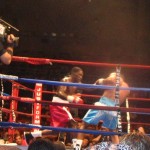-Are The Careers of Brothers Lamont and Anthony Peterson a Case of Bad Career Management-
Several years ago, there was a fairly sizable buzz in the boxing community for the brothers Peterson, Lamont and Anthony. Both undefeated and fighting just one weight division removed from one another, they overcame the harshest of circumstances, living homeless on the streets of Washington D.C. for several years in their youth, to embark on promising professional careers. Lamont, a junior welterweight, showcased slick boxing, while Anthony, a lightweight, deployed more of a boxer-puncher style, relying on raw power and physicality. For all the world, it looked like these two would each be triumphantly hoisting title belts over their heads in just a short time.
Fast forward to today, and each man has received his first chance on the big stage, but come up terribly short. First up was Lamont, who dropped a gaping unanimous decision to junior welterweight kingpin Timothy Bradley, in a title bid in December 2009. Next up was Anthony, who this past weekend was disqualified in the 7th round of a contest against fellow unbeaten lightweight Brandon Rios, for blatant and repeated low blows, seemingly done in an effort to stymie the growing momentum of Rios’s pressure attack.
What happened to the Peterson brothers, both filled with such promise, to have caused them to come up so short in their first real tests as professionals? The answer is hidden in the question itself, and it’s that before these fights neither man had met any substantial opposition in his rise to the top. That’s not necessarily unheard of for promising professional boxing prospects, but in this case, it seems to have derailed their growth as fighters.
Both Anthony and Lamont have all of the physical ability in the world, coupled with a solid foundation of technical skill, heart and will. But on the rise from hot prospect to world class fighter, each man skipped over a few necessary tests.
I attended a card at the D.C. Armory featuring both brothers in May of 2007. Anthony, then 22 years old, was 22-0, and Lamont, at age 23, was 20-0.
Lamont took on John Brown, a fighter whose overall record stood at 23-13-2, but who was in the midst of a 1-10-2 streak, with losses to other undefeated prospects like Herman Ngoudjo and Miguel Cotto, after previously scoring big wins against Gabriel Ruelas and Robbie Peden. Lamont cruised to an 8th round TKO victory.
Anthony met Luis Ernesto Jose, a fighter with a 27-4-2 record, and disposed of him via 9th round TKO to retain his minor WBO NABO belt. Both men seemed poised to take a few large steps up in competition, with a title shot perhaps looming as early as the following year, if they continued to progress. But it never happened. Over the following two and a half years each man’s resume continued to be filled with middling competition, as the two fighters seemingly vanished from the boxing public’s eye.
Finally, each man would get his golden opportunity, but as described above, something was lost during those years. A boxing prospect cannot stay stationary, but must continue to move ahead at all times if he is to develop into a complete pro.
In the animal kingdom you’ll find the shark, a deadly predator which dies if it ever stops swimming ahead, even in its sleep. Boxers – the sharks of the athletic world, always on the prowl individually, looking to exploit weaknesses and attack their prey – must too always be moving forward, taking on new, tougher challenges and being tested in order to improve. It never happened with Lamont and Anthony Peterson, and we saw the results play out in the ring.
The Petersons will hope to have another opportunity to make it back to the top of their respective divisions. Each man is still in his mid 20s, and there’s no shame in Lamont losing to fighters the caliber of Timothy Bradley and Brandon Rios, low blows apart. And clearly neither man is adverse to rising above obstacles and overcoming challenges.
In this case though, it would have been better for their boxing careers if they had been forced to do more of that in the tenuous journey a fighter undergoes from club fights towards main events televised into the homes of millions of fans. The fighters that came up short in their big chances over the past year looked very much the same as the two that I watched live three years prior. Where was the progress? If they aren’t able to take that leap the next time, the Peterson brothers could end up as a case study on poor management, as opposed to shining success.












